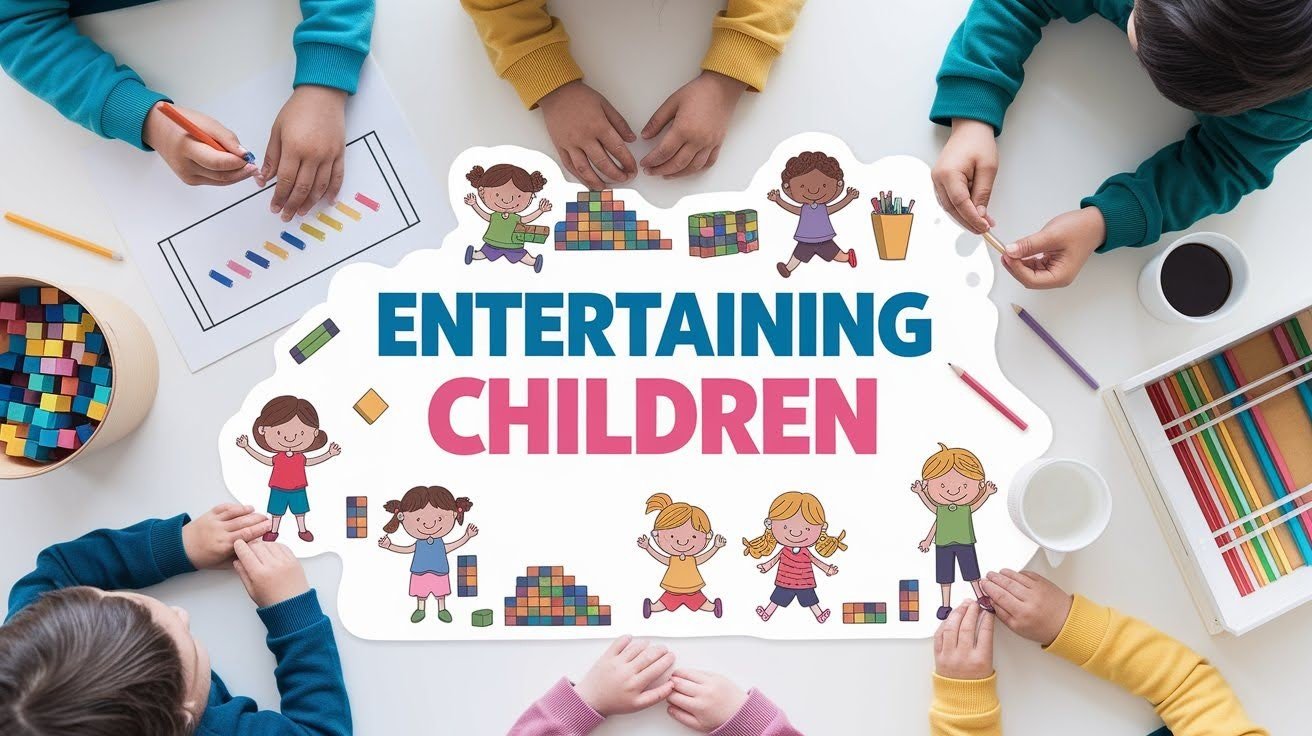Watching your child’s face light up during a simple game of hide-and-seek feels magical. What looks like play is actually shaping their brain, building curiosity, and teaching important life skills.
Parents often wonder how to balance fun with learning. With so many choices, screens, outdoor play, or creative projects, it can feel tricky to know what really helps your child grow. The key is matching activities to their age and stage of development.
Entertainment is more than just keeping kids busy. The right activities build confidence, problem-solving skills, and stronger family connections. When you choose play that fits your child’s needs, you’re not only making memories, you’re preparing them to handle life with creativity and resilience.
11 Fun and Meaningful Ways to Keep Children Engaged
Keeping children engaged isn’t just about fun it’s an opportunity to support their growth, creativity, and confidence through meaningful play:
Focus on Brain-Boosting Activities

Engage your child in puzzles, building blocks, or simple science experiments. These activities are not only fun but also stimulate their mind.
Hands-on play like this strengthens memory, focus, and problem-solving skills. It encourages children to think creatively and explore new ideas.
Completing these activities gives children a sense of accomplishment. Feeling proud of their achievements reinforces a love of learning that can last a lifetime.
Choose Constructive Over Passive Entertainment

Encourage activities where children actively participate, such as role-play, building projects, or cooking together. These experiences make learning engaging and interactive.
While occasional screen time can be educational, it shouldn’t replace hands-on activities. Active participation develops attention spans and problem-solving skills more effectively.
Hands-on experiences also boost creativity and social skills. Working together and exploring new tasks helps children learn to communicate, collaborate, and think imaginatively.
Match Activities to Age and Abilities

Toddlers thrive on sensory play, music, and simple crafts. These activities help them explore the world and develop basic skills.
Older kids enjoy strategy games, outdoor challenges, or more complex art projects. These experiences keep them engaged and encourage critical thinking.
By choosing activities that match your child’s development, you ensure they are challenged and motivated. This approach inspires curiosity and a love for learning new skills.
Make Family Bonding a Priority

Shared experiences like game nights, camping, or collaborative art projects help build trust and communication skills.
Actively participating with your child, rather than just supervising, shows them they are valued.
These moments create lifelong memories and teach the importance of nurturing relationships.
Blend Digital and Traditional Play

Use technology thoughtfully by choosing educational apps or interactive programs. Focus on tools that encourage creativity, problem-solving, or physical activity.
Combine screen-based activities with real-world experiences. This balance ensures children learn to apply skills beyond the digital world.
By integrating technology in this way, children see it as a helpful tool rather than their main source of entertainment.
Encourage Emotional Expression Through Creativity

Art, music, and imaginative play give children safe ways to express their feelings.
Activities like drawing, dancing, or role-playing help them process emotions and build confidence.
These experiences also teach coping strategies, allowing children to have fun while growing in a supportive environment.
Offer Outdoor and Nature-Based Adventures

Time spent outdoors boosts physical health, coordination, and emotional well-being.
Activities like hiking, gardening, bike rides, or backyard exploration help children connect with nature.
These experiences also build resilience and confidence in their abilities, supporting overall growth.
Introduce Cultural and Traditional Activities

Sharing heritage through stories, crafts, or food helps children connect with their roots.
Exploring other cultures through music, art, and festivals broadens their perspectives.
These experiences build identity, empathy, and respect for diversity, making learning both educational and meaningful.
Overcome Scheduling and Resource Challenges

Short, flexible activities often work better than elaborate plans, especially for busy families.
Everyday routines like car games, cooking together, or bedtime stories can be simple yet engaging.
These moments create meaningful connections without needing expensive materials or extra time.
Build Life Skills Through Fun Activities

Games, building projects, and cooking teach children problem-solving and teamwork.
These activities also help develop communication and leadership skills.
Children gain confidence and practical skills that support success in school, relationships, and future careers, all while having fun.
Prepare Children for a Changing World

Balance classic activities with emerging technologies like coding, virtual creativity tools, or interactive learning apps.
These experiences teach children to adapt, think critically, and explore new ideas.
By combining both, children become confident, resourceful, and resilient individuals ready to face any challenge.
Tips for Effective Child Entertainment:
Keeping children happily engaged isn’t just about filling time.e It’s about nurturing their growth, creativity, and confidence:
- Follow Your Child’s Interests: Let their curiosity guide activities to make learning enjoyable.
- Keep It Short and Engaging: Break activities into smaller steps to match attention spans.
- Rotate Activity Types: Mix quiet, active, creative, and social experiences daily.
- Participate Together: Join in the fun rather than only supervising for deeper connections.
- Use Everyday Moments: Turn routines like cooking or walks into playful learning opportunities.
- Encourage Creativity: Give children room to experiment and make mistakes without pressure.
- Celebrate Small Wins: Praise efforts, not just results, to boost confidence and motivation.
Conclusion
Entertaining children in thoughtful ways is about more than passing the time. It helps them grow into confident, creative, and caring individuals. By choosing activities that match their age and mixing play with learning, parents give their children important tools for life. These experiences build curiosity, problem-solving skills, and stronger bonds within the family.
You don’t need costly toys or complicated plans. Simple games, creative projects, and shared time together often mean the most. When families focus on quality interaction, children feel supported and valued.
Over time, these small choices shape lasting habits and character. With patience and consistency, parents can use everyday moments to guide their children toward happiness, growth, and success in the future.
Frequently Asked Questions
What are the best entertainment activities for toddlers?
Simple sensory activities like playdough, finger painting, and music sessions keep toddlers happily engaged. Basic building blocks also develop fine motor skills, spark creativity, and encourage hands-on exploration, helping your little one learn while having fun every day.
How much screen time should children have daily?
For children over 2, 1-2 hours of screen time per day is ideal, focusing on educational content. Balancing digital entertainment with physical play, creative projects, and family time ensures your child enjoys healthy development and meaningful learning experiences.
What are good rainy day activities for kids?
Indoor treasure hunts, cooking together, arts and crafts, fort building, and board games keep children active and entertained on rainy days. These activities encourage creativity, teamwork, and problem-solving while allowing your child to safely enjoy indoor fun.
How can working parents find time for entertaining children?
Even busy parents can create bonding moments by adding short, fun activities like car games, bedtime stories, or cooking together. Just 15-20 minutes of focused, playful interaction daily strengthens your relationship and makes children feel valued.
What entertainment activities help build life skills in children?
Strategy games, cooking projects, building activities, and group sports teach problem-solving, teamwork, and communication. These enjoyable activities combine learning with fun, helping your child develop essential life skills while staying entertained and confident in their abilities.








